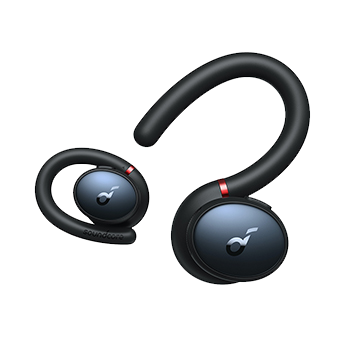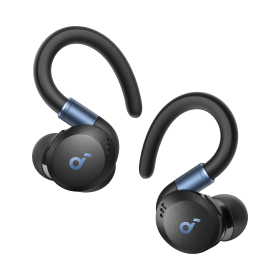Open Back vs Closed Back Headphones: Which Should You Choose?
Choosing the right pair of headphones goes beyond brand or style. It’s about how you experience sound. Whether you’re mixing in a studio, working from home, or listening to music on the go, understanding Open Back headphones and closed-back models can make all the difference in comfort, clarity, and immersion.
Before diving into the specifics, it’s worth noting that many premium Over Ear Headphones today feature advanced designs that balance both performance and practicality. One standout option that combines smart design with professional-grade sound is Space One Pro by soundcore, a top-tier headphone crafted for clarity, comfort, and flexibility in any environment.
Understanding the Difference Between Open Back and Closed Back Headphones
To make the right choice, it helps to understand how Open Back headphones differ from closed-back ones in terms of design, listening experience, and environment.
Open-back designs have earcups with perforations or vents that allow air and sound to pass freely through the back of the speaker driver. This structure creates a wide, natural soundstage, similar to listening to live music. Closed-back headphones, on the other hand, seal your ears completely to block external noise, giving you an isolated and immersive listening experience.
Below, we’ll break down these differences in more detail, covering design, sound quality, comfort, and use case, to help you find the perfect fit for your lifestyle.
Design and Acoustic Engineering
- Open Back headphones: Designed with breathable earcups, these headphones allow airflow through the driver housing. This not only enhances spatial audio realism but also reduces sound pressure buildup inside the cups.
- Closed-back headphones: Feature sealed earcups that prevent sound from leaking in or out, maintaining an isolated environment ideal for recording or commuting.
- The open design results in a more “airy” feel, ideal for quiet spaces, while closed designs create a more private sound bubble, which is perfect for noisy settings.
Sound Experience and Soundstage
- Open Back headphones provide a wide soundstage, offering a sense of depth and dimension that mimics live performances. The music feels like it surrounds you, rather than being confined inside your head.
- Closed-back models deliver punchier bass and tighter sound containment, which can make tracks feel more focused and powerful but slightly less spacious.
- If you prioritize natural acoustics and want to feel like you’re in the same room as the performer, open-back designs are often the best choice.
Comfort and Listening Duration
- The airflow in Open Back headphonesprevents heat buildup, making them more comfortable for long sessions at home or in a studio.
- Closed-back headphones, while excellent for isolation, can trap heat and pressure around the ears over time.
- For comfort, factors such as headband flexibility, earcup padding, and weight distribution matter just as much as design.
Where and How to Use Each Type
- Open Back headphones are best for controlled environments, like studios or quiet home setups, where external noise won’t interfere with your listening.
- Closed-back headphones are better suited for public transport, outdoor activities, or shared office spaces where noise control is essential.
- Ultimately, your environment determines which design enhances your experience most.

Why Many Listeners Prefer Open Back Headphones Today
The popularity of Open Back headphones continues to grow among audiophiles and casual listeners alike. Their ability to recreate natural sound without distortion makes them ideal for music production, detailed listening, or simply enjoying immersive sound at home.
Modern models use advanced materials and acoustic tuning to overcome past limitations such as sound leakage or lower bass intensity. Combined with improvements in driver technology, open-back designs now offer balanced audio that rivals traditional studio monitors.
Let’s explore what makes them increasingly popular and where a model like soundcore Space One Pro fits into this evolution.
A Natural and Spacious Sound Profile
- Open-back headphones excel at reproducing high-resolution sound with a wide dynamic range.
- You hear each instrument clearly, with separation and depth that closed-back designs often compress.
- The soundstage feels expansive, allowing listeners to pinpoint instrument locations with remarkable accuracy.
Enhanced Comfort for Long Listening Sessions
- Open designs reduce ear fatigue, ideal for long hours of mixing or relaxation.
- Airflow keeps the ears cool while maintaining consistent audio performance.
- Lighter pressure on the headband and earcups contributes to long-term comfort.
Ideal for Critical Listening and Studio Work
- Open Back headphones are commonly used by sound engineers for accurate sound reproduction.
- They reveal imperfections in tracks that closed systems might conceal, helping users achieve better mixes and mastering results.
- Their clarity and spatial depth make them invaluable tools for creators and audiophiles.
Product Highlight — Space One Pro
If you’re searching for high-performance Open Back headphones that balance professional audio and daily convenience, soundcore Space One Pro by soundcore stands out as a leading choice.
While it’s technically a hybrid-style headphone, its design and audio fidelity make it perfect for listeners who want immersive, high-resolution sound with comfort and control. Let’s explore its standout qualities:
Key Features of Space One Pro
- soundcore-Engineered FlexiCurve™ Structure:Reduces soundcore Space One Pro’s size by 50% with its super foldable, portable design—ideal for users who travel frequently or switch between studio and casual use.
- Exclusive 4-Stage Noise Cancelling System:Cancels out ambient noise in real time, providing clear sound even in dynamic environments.
- Drivers with Triple Composite Diaphragms:Deliver distortion-free Hi-Res audio for precise sound reproduction that rivals traditional Open Back headphones.
- Long-Lasting Listening:Enjoy up to 40 hours of playtime with ANC on and 60 hours without. A 5-minute charge gives you 8 hours of music, which is perfect for busy days.
- All-Day Comfort:The pressure-relieving headband and soft earcups allow extended wear with no fatigue, blending luxury with practicality.
These features make Space One Pro an exceptional choice for anyone who values comfort, accuracy, and sound immersion, qualities that align perfectly with what listeners love about open-back designs.
Choosing the Right Headphones for Your Lifestyle
The decision between Open Back headphones and closed-back models comes down to your priorities and environment.
If you crave spacious, natural sound and typically listen in quiet surroundings, open-back headphones will give you a more realistic, “live” listening experience. But if you need privacy and isolation, say, for travel or work, closed-back designs may be more practical.
With technology like that found in Space One Pro, you can enjoy much of the open-back feel while retaining convenience and flexibility. Modern engineering continues to close the gap between these two categories, giving listeners more options than ever.

How to Get the Best Out of Your Headphones
- Match your headphone type to your environment for the best sound performance.
- Use high-quality audio files or lossless streaming for accurate sound reproduction.
- Regularly clean and maintain your earcups to ensure long-term comfort and hygiene.
- Consider headphone amplifiers or DACs if you want to maximize performance for open-back models.
Final Thoughts
Understanding Open Back headphones versus closed-back headphones helps you make an informed choice that fits your lifestyle, sound preferences, and comfort needs. Open-back designs deliver unmatched spatial sound and natural acoustics, while closed models excel in privacy and noise isolation.
For those who want flexibility, comfort, and clarity, soundcore Space One Pro offers the best of both worlds, professional-grade sound wrapped in a travel-friendly, foldable design. Whether for home listening, travel, or work, it’s a versatile companion for all your audio experiences.





























































